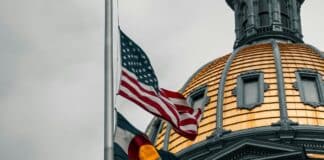Former President Donald Trump’s potential selection of Florida Senator Marco Rubio as his 2024 running mate has sparked considerable interest, raising questions about constitutional constraints.
The U.S. Constitution’s Article II, Section I stipulates that during the Electoral College proceedings, electors must vote for two persons, with at least one not from their own state. This provision could pose a challenge if both Trump and Rubio, currently Florida residents, form a ticket.
Florida’s substantial 30 electoral votes and the anticipated close nature of the election make a Trump-Rubio pairing riskier due to constitutional implications.
Rubio’s office declined to comment on the matter during a recent appearance on “Fox News Sunday.”
If Rubio retains Florida residency and Trump chooses him as a running mate, complications arise. Florida electors couldn’t vote for both men, potentially leaving the vice presidency in limbo if Trump doesn’t secure the required electoral votes.
In such a scenario, the decision would shift to the Senate, with the majority potentially determining the outcome. However, overcoming Senate procedural hurdles, like the 60-vote supermajority, could pose challenges.
Rubio could resolve this issue by resigning from the Senate and relocating to another state, similar to Dick Cheney’s strategy in 2000. However, the timing of such a move is critical, given impending election deadlines.
Alternatively, Rubio could establish residency outside Florida, although legal experts note the complexities of proving intent to permanently reside elsewhere.
Despite residency changes, Rubio’s eligibility to represent Florida in the Senate remains unaffected, as the Constitution defines senatorial qualifications.
Rubio could theoretically adjust his residency strategy based on electoral outcomes, potentially relocating before the Electoral College vote, although this maneuver could prompt legal challenges given the constitutional intent to prevent presidential and vice-presidential candidates from the same state.
Experts acknowledge the potential for legal debates and congressional actions to address such scenarios, highlighting the intricate dynamics surrounding presidential and vice-presidential selections under constitutional guidelines.






